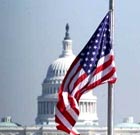|
|
|
House judiciary panel subpoenas dismissed US Attorneys
Breaking Legal News |
2007/03/03 13:28
|
| The US House Judiciary Subcommittee on Commercial and Administrative Law voted Thursday to subpoena former Justice Department prosecutors Carol C. Lam (San Diego), David C. Iglesias (New Mexico), H.E. Cummins, III (Arkansas), and John McKay (Seattle), to testify at a subcommittee hearing next Tuesday. The subcommittee issued the subpoenas after the former US Attorneys privately told representatives that they would not voluntarily testify. Several of the prosecutors had been engaged in politically sensitive cases. Lam had prosecuted former Republican congressman Randy "Duke" Cunningham and Igleias was investigating local Democrats for a kickback scheme. McKay decided against empaneling a grand jury to examine accusations of voter fraud in Washington State's 2004 election for governor, which was won by a Democrat. Eight federal prosecutors received phone calls on December 7 saying that they were being asked to resign, without explanation. Brian Roehrkasse, a spokesperson for the Justice Department, told the New York Times that the DOJ has "never removed a United States attorney in an effort to retaliate against them or inappropriately interfere with a particular investigation, criminal prosecution or civil case." The firings have sparked arguments about the power of the US Attorney General to indefinitely appoint replacement prosecutors, and also allegations that the firings were politically charged. Earlier this week Iglesias told reporters that federal lawmakers pressured him to speed up indictments of local Democrats in time for the November elections. In testimony before the Senate Judiciary Committee last month, Deputy Attorney General Paul McNulty denied that the removal of the attorneys was motivated by political considerations. |
|
|
|
|
|
|
Class action or a representative action is a form of lawsuit in which a large group of people collectively bring a claim to court and/or in which a class of defendants is being sued. This form of collective lawsuit originated in the United States and is still predominantly a U.S. phenomenon, at least the U.S. variant of it. In the United States federal courts, class actions are governed by Federal Rules of Civil Procedure Rule. Since 1938, many states have adopted rules similar to the FRCP. However, some states like California have civil procedure systems which deviate significantly from the federal rules; the California Codes provide for four separate types of class actions. As a result, there are two separate treatises devoted solely to the complex topic of California class actions. Some states, such as Virginia, do not provide for any class actions, while others, such as New York, limit the types of claims that may be brought as class actions. They can construct your law firm a brand new website and help you redesign your existing law firm site to secure your place in the internet. |
Law Firm Directory
|
|





